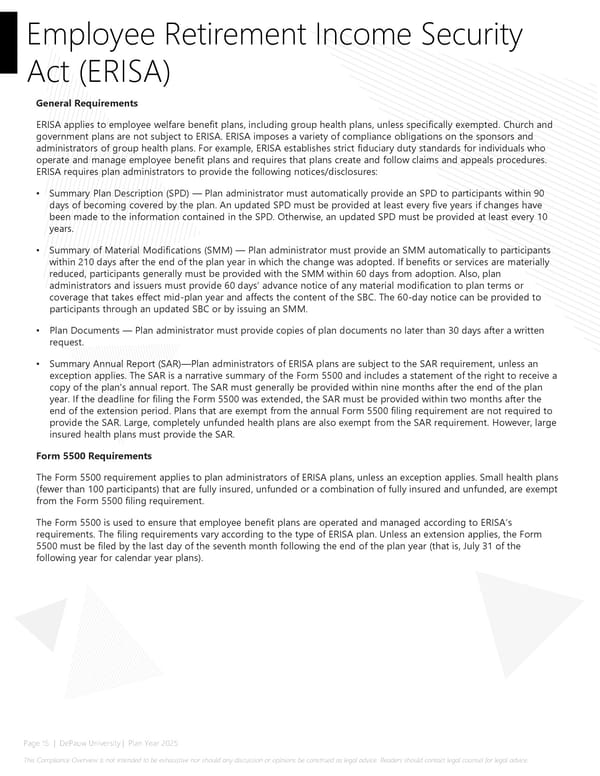Employee Retirement Income Security Act (ERISA) General Requirements ERISA applies to employee welfare benefit plans, including group health plans, unless specifically exempted. Church and government plans are not subject to ERISA. ERISA imposes a variety of compliance obligations on the sponsors and administrators of group health plans. For example, ERISA establishes strict fiduciary duty standards for individuals who operate and manage employee benefit plans and requires that plans create and follow claims and appeals procedures. ERISA requires plan administrators to provide the following notices/disclosures: • Summary Plan Description (SPD) — Plan administrator must automatically provide an SPD to participants within 90 days of becoming covered by the plan. An updated SPD must be provided at least every five years if changes have been made to the information contained in the SPD. Otherwise, an updated SPD must be provided at least every 10 years. • Summary of Material Modifications (SMM) — Plan administrator must provide an SMM automatically to participants within 210 days after the end of the plan year in which the change was adopted. If benefits or services are materially reduced, participants generally must be provided with the SMM within 60 days from adoption. Also, plan administrators and issuers must provide 60 days’ advance notice of any material modification to plan terms or coverage that takes effect mid-plan year and affects the content of the SBC. The 60-day notice can be provided to participants through an updated SBC or by issuing an SMM. • Plan Documents — Plan administrator must provide copies of plan documents no later than 30 days after a written request. • Summary Annual Report (SAR)—Plan administrators of ERISA plans are subject to the SAR requirement, unless an exception applies. The SAR is a narrative summary of the Form 5500 and includes a statement of the right to receive a copy of the plan's annual report. The SAR must generally be provided within nine months after the end of the plan year. If the deadline for filing the Form 5500 was extended, the SAR must be provided within two months after the end of the extension period. Plans that are exempt from the annual Form 5500 filing requirement are not required to provide the SAR. Large, completely unfunded health plans are also exempt from the SAR requirement. However, large insured health plans must provide the SAR. Form 5500 Requirements The Form 5500 requirement applies to plan administrators of ERISA plans, unless an exception applies. Small health plans (fewer than 100 participants) that are fully insured, unfunded or a combination of fully insured and unfunded, are exempt from the Form 5500 filing requirement. The Form 5500 is used to ensure that employee benefit plans are operated and managed according to ERISA’s requirements. The filing requirements vary according to the type of ERISA plan. Unless an extension applies, the Form 5500 must be filed by the last day of the seventh month following the end of the plan year (that is, July 31 of the following year for calendar year plans). Page 15 | DePauw University | Plan Year 2025 This Compliance Overview is not intended to be exhaustive nor should any discussion or opinions be construed as legal advice. Readers should contact legal counsel for legal advice.
 2025 DePauw Compliance Bundle Page 14 Page 16
2025 DePauw Compliance Bundle Page 14 Page 16